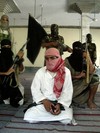A Pakistani tribe killed 23 Taliban fighters during clashes in the Mohmand tribal agency. The fighting took place in the Anbar region in Mohmand, right on the border with the Bajaur tribal agency, where the military and the Taliban are again battling for control.
A tribal lashkar, or militia, numbering 150 fighters battled a Taliban force of unknown number. The Taliban are reported to have kidnapped and killed three of the lashkar fighters, and torched the homes of five villagers during the fighting.
Tribal lashkars have had little success against the Taliban in the past
A tribal lashkar in Upper Dir, far north of Mohmand, is also battling the Taliban after a suicide bomber leveled a mosque in a remote town and killed more than 50 worshipers. The Dir lashkar is “losing steam,” a Pakistani official told The Long War Journal. The Dir lashkar has been fighting for five weeks and has had little success in ousting the Taliban from their mountain bases.
Last fall, the Pakistani government and the military encouraged tribal leaders to raise lashkars to oppose the spread of the Taliban. Since the beginning of 2008, Pakistani tribes have organized lashkars in regions in Bajaur, Peshawar, Khyber, Swat, Dir, Buner, and Lakki Marwat. The tribes have had some success in driving the Taliban from local areas by conducting patrols and burning down the homes of Taliban fighters and their supporters, but ultimately the tribes have failed to halt the Taliban advance.
The Taliban have viciously responded to efforts by tribal leaders to oppose the spread of extremism in the tribal areas. Tribal opposition has been violently attacked and defeated in Peshawar, Dir, Arakzai, Khyber, and Swat. Suicide bombers have struck at tribal meetings held at mosques, schools, hotels, and homes.
The Taliban have also made examples of local leaders who have dared to resist. Last December, the Swat Taliban executed a local tribal leader named Pir Samiullah, then returned to the village to dig up his body and hang it in the town square. The villagers were warned not to remove his body or they would face the same fate.
Problems with manpower, training, geography, coordination between the tribes, and lack of support from the military and government plague the tribal efforts to oppose the Taliban. And often, the tribes do not want the support of the government and the military.
Military claimed Mohmand was cleared months ago
The recent fighting in Mohmand belies the Pakistani military’s claim that the tribal agency has been cleared of the Taliban. On March 1, a senior Pakistani officer said the Taliban had been defeated during a series of security operations in Mohmand. Colonel Saif Ullah claimed that the region is “under the control of law enforcement agencies” and that the Taliban had been ejected from Mohmand.
There have been several major battles in Mohmand since the military declared victory. The Taliban have carried out several large-scale ambushes and attacks on military outposts, while the military has responded with airstrikes and artillery attacks.
Mohmand under command of able Taliban leader
The Mohmand Taliban is commanded by Omar Khalid, who is a deputy of Baitullah Mehsud’s Taliban movement. He is considered one of the most effective and powerful leaders in the tribal areas after Baitullah and Hakeemullah Mehsud.
Khalid gained prominence in Mohmand during the summer of 2007, when he took over a famous shrine and renamed it the Red Mosque, after the radical mosque in Islamabad whose followers had attempted to impose sharia in the capital.
Khalid became the dominant Taliban commander in Mohmand in July 2008 after defeating the Shah Sahib group, a rival pro-Taliban terror outfit with ties to the Lashkar-e-Taiba. The military claimed it killed Khalid in January of this year, but the Taliban denied the report, and he has since surfaced.
The Mohmand Taliban took control of the tribal agency after the Pakistani government negotiated a peace agreement with the extremists at the end of May 2008. The deal required the Taliban to renounce attacks on the Pakistani government and security forces. Both sides exchanged prisoners.
The Taliban promptly established a parallel government in Mohmand. Sharia courts were formed and orders were given for women to wear the veil in public. “Criminals” were rounded up and judged in the sharia courts. Women were ordered to have a male escort at all times and prevented from working on farms. The Taliban also kidnapped members of a polio vaccination team.









1 Comment
The Thunder Run has linked to this post in the blog post From the Front: 07/15/2009 News and Personal dispatches from the front and the home front.